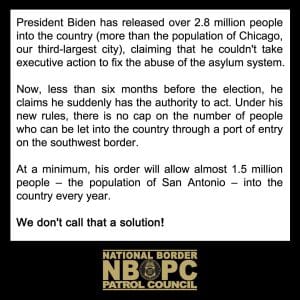The following is from Episode 39 of the State of the Union podcast which aired on February 20, 2015. It deals with the OBP’s memorandum concerning the decertification of AUO. http://goo.gl/dOQI53
Shawn Moran: Welcome to the “State of the Union” for the National Border Patrol Council. I’m Shawn Moran.
This is a very special episode as yesterday Chief Michael Fisher put out a memo detailing OBP’s actions for the decertification of AUO and the plans that the Border Patrol is taking moving forward in terms of pay. So we wanted to get some more information on that so we went to the union’s chief point of contact, the president of the National Border Patrol Council, Brandon Judd.
Brandon, welcome back to the show, sir.
Brandon Judd: Thanks, Shawn, I appreciate it.
Shawn Moran: So where are we at right now and what is the Union’s involvement? Can you shed a little light on what’s happening?
Brandon Judd: OK, Chief Fisher obviously sent out a memorandum to the sector chief patrol agents yesterday notifying them that they are going to be decertifying agents.
Now this memorandum was supposed to be negotiated. In fact, the memorandum was negotiated and then the agency changed the memorandum at the last minute. That is not the memorandum that was negotiated at all. The National Border Patrol Council was not complicit in this action in any way, shape or form. However, the National Border Patrol Council does have to negotiate when the agency is going to make a change in working conditions and this is obviously a change in working conditions.
The National Border Patrol Council continues to advocate for AUO and we’re doing everything that we can behind the scenes on the hill that we can possibly do. We’re not happy with this move in any way, shape or form. But at the same time we have to comply with the laws in our negotiation responses.
The agency unfortunately has the right to decertify Border Patrol agents from the use of AUO. They have that right to do it, and again we’re working on the hill to try to reverse that decision.
The problem that we’re facing is that this is still a legal issue. I received a notification. This was emailed to me on Feb. 18, 2015. Again it was emailed to me by a LER Specialist Renee Pierce.
In this, it says: “This letter serves to notify the National Border Patrol Council of U.S. Custom and Border Protection’s intent to update the administratively uncontrollable overtime in line with AUO regulations found in 5 CFR 550.141 through 162.”
That’s all legal jargon. But basically what this notice goes on to say is that the law prohibits us using excludable days under AUO when calculating the weekly average of irregular and occasional use of overtime work.
They are going after the excludable days of our agents and saying that it’s illegal to use excludable days in the calculation. Now, again, we disagree with this 100 percent. We think they are misinterpreting the laws. We think they are misapplying the laws.
But the fact remains that the agency is going to do what the agency is going to do, and we have to do the best that we can do to, in the interim, get the most that we can possibly get for the agents.
So the decertification of AUO, the agency, unfortunately for us, by law, has the right to decertify agents.
We don’t like it. We don’t agree with it. Nor are we complicit with this, and we will continue to do everything we can do to fight it. But in the interim, while we all know that litigation takes a long time. It’s not something that happens tomorrow. So in the interim, we have to negotiate the best that we can.
So what we’ve gotten for the agents is everybody is going to get an even cut of the pie as opposed to targeted enforcement. That was part of the negotiations. We are going to get an alternative work schedule. That’s part of the negotiations.
We’re going to go away from the clean shifts, which has absolutely killed our agents because now you are never home. On the clean shifts, even if you are on a day shift, you start your day at 8 o’clock in the morning. You don’t get done until 6 o’clock at night and most agents have a good hour to 45 minute drive till they get home. They don’t get home until 7 o’clock in the evening. This absolutely and totally kills your days. The agency has always known that, but they didn’t care. They didn’t care. They did it because it saves them money. They didn’t care about the agents.
And this is what we are faced with today. These are the things we are faced with.
So what we have to do is we have to negotiate, and we were able to negotiate an alternative work schedule. We were also able to negotiate getting away from the clean shifts. We were also able to negotiate that everybody will get an even cut of the pie across the board.
There’s this misnomer out there that we’ve been made FLSA exempt. That is not true. We are not FLSA exempt. OPM has to issue the directive and guidelines that make us FLSA exempt, and even if they issue those directives and guidelines that say we are FLSA exempt, we are not done. There is still the courts that get to decide and determine whether we are FLSA exempt.
So, in the interim, you are not going to be paid FEPA, you are going to be paid under the Fair Labor Standards Act. There are two different acts that employees get paid under. You got the Federal Employee Pay Act and you’ve got the Fair Labor Standards Act.
We are currently covered under the Fair Labor Standards Act. The Fair Labor Standards Act for overtime pays more money than the Federal Employee Pay Act. And so when this gets implemented sometime in April, as per the memorandum from Chief Fisher, if OPM did not issue their regulations that we are FLSA exempt, then we will continue to be paid FLSA which is more commonly known as 45 Act. So our agents will be getting paid 45 Act and not FEPA until OPM issues that guideline. So those are the things that are happening, those are the things that are going on.
In most cases, the agents will see an increase in their paychecks. They will not see a decrease. They will see an increase in their paychecks. And that’s currently what’s happening today.
Shawn Moran: So to summarize for the membership, the union was notified and once we are notified of a change, we have a duty to bargain. We have to respond to those changes. But you’re saying we do have points of contention, and there will be some kind of follow-up action for the points of contention. Is that correct?
Brandon Judd: That is correct. In fact, just so agents know and understand how the negotiation process works…let’s just say that the agency notifies us that they are going to decertify us, or they notify us that they are going to take any sort of action…If we refuse to bargain, then the agency has the right to implement how they want to implement. And in that case, the decertification, we wouldn’t have gotten any of the things that we just described: The alternative schedule, the clean shifts, agents getting overtime equally across the board.
Had we not negotiated, we would not have gotten any of those things because the agency would have been free to implement how they wanted to implement. So when we are notified, we have a legal obligation to respond. And if we don’t respond, then the agency is free to implement how they want to do it and there’s not a darn thing that we would be able to do after that.
Shawn Moran: That’s Brandon Judd, National Border Patrol Council president, coming on and explaining exactly what is happening with the decertification of AUO and the union’s response to those actions by OBP and Customs and Border Protection.
Brandon, thanks for coming on the show and we hope to have you back real soon when there are any further developments.
Brandon Judd: Thanks Shawn. I appreciate it.


